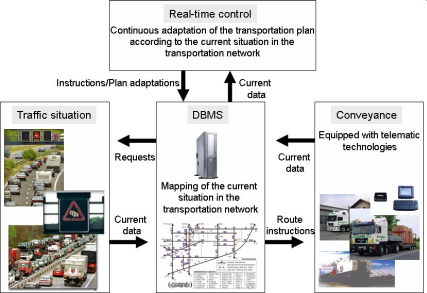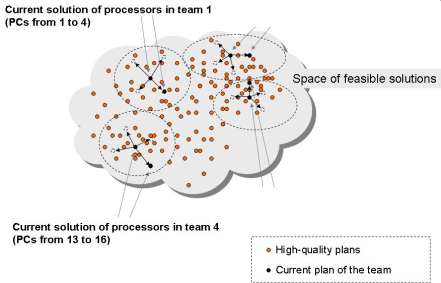Research Profile
Brief Overview
Our main research interest is the development and use of modern information and application systems in order to solve economic problems of practical relevance. Furthermore, we make use of problem-oriented models and methods of Operations Research. Specifically, our research is focused on efficient planning and controlling of complex processes in production and freight forwarder transportation networks. This particularly includes problems of supply chain management in its broadest sense.
In addition to a realistic modeling of such problems, our research activities are primarily focused on the development of efficient algorithms that enable us to solve these problems. The process of designing and applying these solution procedures involves the use of modern information and communication technologies. Among the developed solution procedures there is, for example, a range of distributed optimization approaches that were specially developed for the use in modern companywide distributed heterogeneous computer networks.
Selected Results

Control of freight forwarder transportation networks
One main finding of our research on transportation and traffic planning is the development of a new approach for real-time control of freight forwarder transportation networks. This approach was prototypically implemented and validated for different scenarios. By using modern information and communication technologies, this approach enables real-time control of transportation processes and traffic flows in real freight forwarder networks. The basis for this approach is a general new control concept that provides a continuous optimization of all existing transportation plans simultaneous to their execution. With this approach, it is for the first time possible to efficiently control even highly complex, dynamic, and error-prone transportation processes. By making use of sophisticated optimization techniques, it is capable of reacting adaptively to disruptions in the network. With regard to the specific temporal restrictions of real-time control, plans that are already in execution are continuously adapted to the dynamically changing situation. In order to generate a flexible and efficient execution of transportation processes, the control system integrates multiple transshipments and multi-mode transportations for the first time. Note that alternative tours are continuously explored for each request as long as it has not reached its final destination. Furthermore, different forms of cooperation between freight forwarders are explicitly taken into account. By significantly increasing the scope of decisions compared to previous approaches, the adaptability of the deployed control is considerably improved. On the basis of well-known solution principles, new optimization techniques that work efficiently even under real-time conditions were developed. The efficiency of these procedures was validated by extensive simulation studies.

Real-time control of mixed-model assembly lines
In production logistics, works are so far focused on approaches that deal with long-term planning and real-time control of the goods flow in modern production systems of mass customization. For example, a new approach for distributed real-time control of mixed-model assembly lines was developed and prototypically realized in distributed computer networks. The distributed algorithms developed for this approach are able to react in real-time to unexpected disturbances in order to ensure an efficient continuation of the production process by a goal-oriented reorganization of the production plans. n.
Assembly line balancing with regard to aspects of mass customization
One main focus of our research is the development of efficient approaches for assembly line balancing. Whereas assembly lines were originally designed for the efficient production of only one product in large quantities, modern mixed-model assembly lines have to produce theoretical production programs of several billion models. This requires a high degree of adaptability within the layout of an assembly line. In order to achieve this aim, we developed a new planning approach. It comprises a specific variant management as well as instruments for personnel and task process planning. In order to solve this complex problem, various distributed algorithms were developed that can also be realized in ordinary companywide PC networks. Since these computers are usually used simultaneously by ordinary office applications, unpredictable, dynamically changing background loads have to be taken into consideration. Thus, a dynamic load balancing method was integrated into the procedure in order to enable an efficient use of existing idle times.
Layout planning
Further works deal with the layout organization of production systems. Here the integrated examination of internal transportation paths is of special interest. This led to a new, more comprehensive facility layout planning approach. Specifically, it allows a more detailed layout planning that simultaneously determines facility arrangements and transportation path designs. In order to generate the layouts, a specific optimization algorithm with variable neighborhoods was developed and implemented.
Scheduling algorithms
One current research project is concerned with the development of new methods for the sequence planning of specific application scenarios. In cooperation with the IOMS Department of the Stern School of Business in New York, a new general decomposition technique was developed. This technique leads to substantial accelerations of the best known solution procedures.
Development of new general solution approaches

The findings of our research work also formed the basis for problem-specific improvements and developments of different sequential and distributed heuristics and accurate optimization algorithms. For example, new distributed fault-tolerant Branch-and-Bound algorithms and dynamic load balancing methods were specifically developed and applied to various applications. Applying these new load balancing techniques, companywide PC networks can be used efficiently even in adversarial scenarios characterized by significant, dynamically changing background loads. Moreover, a distributed breadth first Tabu-Search-Variant for long term planning problems was developed.
Selected Publications
- Bock, S.: Real-time control of freight forwarder transportation networks integrating multimodal transports and multiple transshipments. European Journal of Operational Research Vol.200, S.733-746, 2010.
- Bock, S.; Pinedo, M.: A Decomposition Scheme for Single Stage Scheduling Problems. Angenommen zur Veröffentlichung beim Journal of Scheduling, 2010.
- Bock, S.: Supporting Offshoring and Nearshoring Decisions for Mass Customization Manufacturing Processes. European Journal of Operational Research Vol. 184, S.490-508, 2008.
- Ferrucci, F.; Bock, S.: Statische Analyse des Optimierungspotenzials einer Nachlieferungssteuerung für Tageszeitungen. Im begutachteten Tagungsband: Mattfeld, D.C.; Günther, H.-O.; Suhl, L.; Voß, S. (Hrsg.): Informations- und Kommunikationssysteme in Supply Chain Management, Logistik und Transport, S.137-152, Books on Demand GmbH, Norderstedt, 2008.
- Bock, S.: Using Distributed Search Methods for Balancing Mixed-Model Assembly Lines in the Automotive Industry. OR Spectrum Vol. 30, S. 551-578, 2008.
- Bock, S.; Hoberg, K.: Detailed Layout Planning for Irregularly-Shaped Machines with Transportation Path Design. European Journal of Operational Research Vol. 177, S.693-718, 2007.
- Bock, S.; Rosenberg, O.; van Brackel, T.: Controlling mixed-model assembly lines in real-time by using distributed systems. European Journal of Operational Research Vol. 168, S.880-904, 2006.
- Bock, S.: A new Mixed-Model Assembly Line Planning Approach for an efficient Variety Steering Integration. Im begutachteten Best Paper Sammelband des International Mass Customization Meeting (IMCM'05). Springer, S.187-210, 2006.
- Bock, S.; Pinedo, M.: A Decomposition Technique for Speeding Up Single Stage Scheduling Algorithms using Parallel Machines. Working Paper of the Stern School of Business, New York.
- Bock, S.: Solving complex QAP-instances by a PC-LAN. In: Günther, H.-O.; Mattfeld, D.C.; Suhl, L.: Supply Chain Management und Logistik: Optimierung, Simulation, Decision Support, Physica, Heidelberg, S.531-552, 2005.
- Bock, S.: Echtzeitfähige Steuerung von Speditionsnetzwerken. Gabler DUV, Wiesbaden, 2004.
- Bock, S.; Rosenberg, O.: A new parallel breadth first tabu search technique for solving production planning problems. Journal International Transactions in Operational Research (ITOR) Vol. 7(6), S.625-635, 2000.
- Bock, S.: Modelle und verteilte Algorithmen zur Planung getakteter Fließlinien. Gabler DUV, Wiesbaden, 2000.

